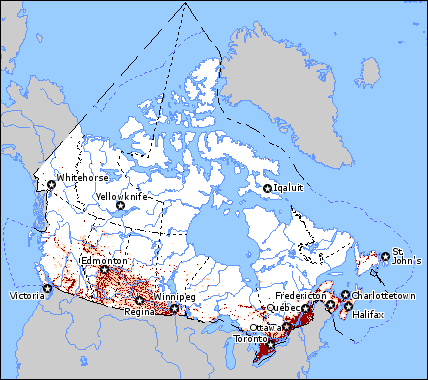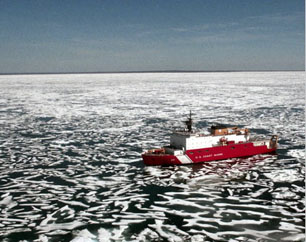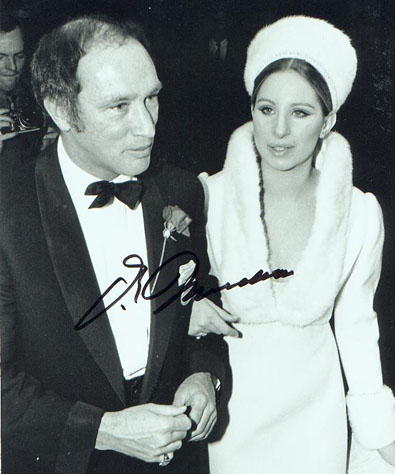Canadian Arctic sovereignty – what does PM Harper really mean?
Aug 22nd, 2010 | By Randall White | Category: In Brief
Canadian population distribution in the 2006 census: the darker shade of red/pink an area on the map is, the more people live there. Less than 1% of Canada’s population lives in the completely white areas. SOURCE: The Atlas of Canada/Statistics Canada.
I sometimes think stiffening Canadian sovereignty in those parts of the Arctic north customarily marked as Canadian territory on Canadian maps is one of the three almost impressive things that Stephen’s Harper’s Conservative minority government has done, since it first came to office on February 6, 2006.
The other two are the parliamentary recognition of the Québécois as a nation within a united Canada, and a few failed attempts at so-called step-by-step Senate reform. In both these two cases Mr. Harper might be said to have gone soft, after an initial hard thrust in promising directions. Now I’m wondering whether something similar is happening on the Canadian Arctic sovereignty front too.
I was impressed by some “new rules regulating Arctic shipping” in what Canada sees as Canadian waters, introduced this past Canada Day, July 1, 2010. But a Harper government Foreign Affairs paper released this past Friday makes me wonder if I’ve let myself be impressed too soon? John Ibbitson writes in the Globe and Mail that this “report does signal to other northern nations that this country wants to advance a shared agenda for the Far North rather than simply to assert territorial claims.” And this no doubt makes sense. Yet a Toronto Star editorial also sensibly worries about how the same “statement openly hails the US as ‘our premier partner’ in the North … Harper seems to envisage Canada and the US collaborating … to advance a North American agenda on the resource-rich continental shelf, waterways and other issues.”
In a hopeful new age of far northern development, Canada has to cooperate rather intimately with the Unites States in Arctic management on the non-Russian side of the North Pole. (And with Denmark – which can presumably be a kind of safety valve in of-course-never-exactly-equal Canada-US dealings as well.) But Mr. Harper’s frequently voiced affection for the last Canadian vestiges of the British monarchy can raise some fresh concerns about how he ultimately sees Arctic-sovereign relations with the former British subject of the USA today.
* * * *

The United States Coast Guard icecutter Healy on a voyage in the Arctic Circle. Photo: United States Coast Guard.
After more than four years in office, it has become increasingly clear that “PM Harper” too often seems most comfortable with old colonial and imperial conceptions of Canadian development, that (properly inspired by American examples) many of us have long been hoping the country has finally grown out of.
He is aptly up-to-date about these conceptions, and does not doubt that the old great imperial metropolis of the global anglosphere has moved from London to Washington (or Washington/New York/Los Angeles/Chicago.etc). Yet – again as in the cases of both the emerging recognition of a Québécois nation and Senate reform – as Stephen Harper’s real, down-on-the-ground approach to Canadian Arctic sovereignty begins to take more substantial shape, it is starting to seem that we really may have to start wondering about just how serious it all is. Just how ready is PM Harper to “stand up for Canada,” in, eg, longstanding Canada-US disagreements over the Northwest Passage and the Beaufort Sea?

Pierre Trudeau and Barbara Streisand. He was a new kind of Canadian patriot. But it would be wrong to call him anti-American. And he finally made the present-day Canadian Constitution more like that of the United States.
John Ibbitson notes that (like last year etc, some will recall) Mr. Harper “leaves on Monday for a five-day northern tour … Politically, the Conservatives are hoping to profit from increasing interest over Arctic sovereignty, which is perhaps another manifestation of an emerging noisier patriotism among many Canadians.” Yet, for this kind of plot to work among the cunning masses of Canadian voters you have to want to do more than just profit electorally from the emerging noisier patriotism. You actually have to join it.
Pierre Trudeau was Canadian federal prime minster, minority and majority, for some 15 years, partly because, whatever else you thought about him, it was absolutely clear that he was some new kind of Canadian patriot. It is still apparently not quite clear just what Stephen Harper is in this respect. You sometimes wonder whether he knows himself?

